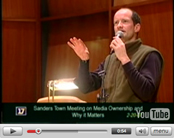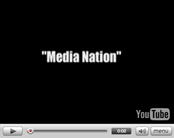Discuss E-List
Essential Resources Guide
FREE Teaching Resources
Membership Benefits
Partner Discounts
Summit 2006
Food For Thought
Food For Thought: Challenging Big Food/Media’s Monopoly Over Our Media Culture (PDF Version)
Overview
You know the old saying – “you are what you eat”? Many Americans don’t give much thought to the food and drink we consume daily. We are busy and over-extended – trying to work (to put food on the table, remember?), pay our bills, raise our families, and find some time in our days for rest and re-creation. We are overwhelmed with too much information. And, we are conditioned to accept certain ways of thinking about our relationship to food, a value system shaped by family, habit tradition, and the endless “food-related” stories told by a corporately-owned media culture supported by the advertising, marketing, and public relations power of giant multinational food-producing corporations (Think McDonald’s sponsoring of “Sesame Street,” or Archer Daniels Midland’s underwriting of National Public Radio.)
Americans often don’t consider what “cheap food” means to the whole agricultural system. Factory produced, highly processed, inexpensive food in our grocery stores means below-poverty income levels for family farmers across the U.S., and, as global trade expands, across the world. Just as some citizens have become more aware of what it means for young workers in Asian countries when we buy a pair of Nikes, consciousness is being raised around what cheap meat, milk, and grain means for our farmers and farm workers. The global food supply is becoming horizontally and vertically integrated in much the same way as the global media is, and studying agricultural issues can open windows though which to view media consolidation. Knowledge is power. Even one simple fact – i.e. one out of every ten dollars American consumers spend on food goes to one giant corporation (tobacco giant Altria – formerly Philip Morris) – can begin to shift thinking about the importance of designing and supporting alternatives to our current food production, distribution and consumption patterns.
“Food For Thought” is an ACME-created collection of activities and resources designed to use media literacy education – teaching ourselves how to access, analyze, evaluate and produce media - to help us raise important questions about our relationship to our food. “Food For Thought” is especially interested in focusing on how powerful media players, including large multi-national corporations, and large corporate agribusiness organizations use our media systems to persuade us to adopt certain ways of thinking, buying, and eating that run counter to our long- term concerns: health, wealth, wisdom, and sustainability. “Food For Thought” also seeks to offer viable food-based alternatives and grassroots



![View your cart items []](/sites/default/modules/ecommerce/cart/images/cart_empty.png)






